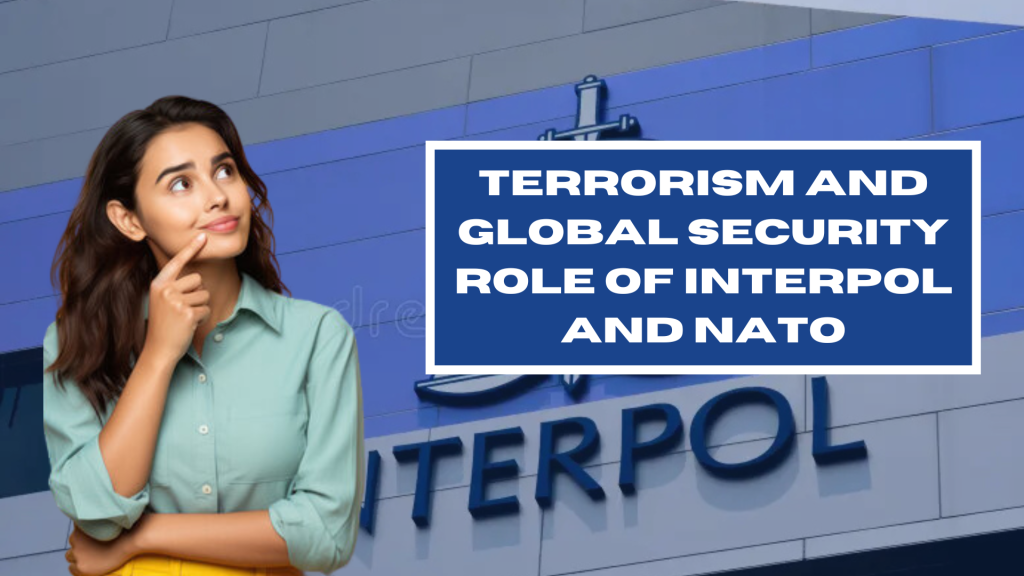In a world increasingly shaped by interconnectedness, the shadow of terrorism looms large, posing a significant threat to global security. As a student preparing for competitive exams, you may often encounter questions on international security frameworks, geopolitical strategies, and global institutions. Understanding the critical roles played by organizations like Interpol and NATO in combating terrorism can enhance your knowledge and help you present well-rounded answers in your exams.
This topic not only holds academic value but also offers insights into how global collaborations work to safeguard societies, maintain peace, and foster stability. Let’s delve deeper into how Interpol and NATO contribute to the global fight against terrorism.

Understanding the Threat of Terrorism
Terrorism transcends national boundaries, leveraging modern technology, exploiting socio-political tensions, and challenging traditional security mechanisms. It involves:
- Political and Ideological Motives: Often aimed at destabilizing governments or advancing extremist ideologies.
- Use of Violence and Intimidation: Targeting civilians, infrastructure, and national symbols.
- Global Impact: Affecting international travel, trade, and creating widespread fear.
The Role of Interpol in Counter-Terrorism
Interpol, or the International Criminal Police Organization, plays a rather important role in enhancing global security by facilitating international police cooperation. With 195 member countries, Interpol acts as a bridge for law enforcement agencies across borders. Interpol as the name suggests does play a rather important role when it comes to global security and in curbing terrorism.
Key Functions of Interpol in Combating Terrorism:
- Intelligence Sharing: It operates a global database of terrorist suspects, stolen documents, and criminal activities. It also supports member countries with real-time intelligence and analysis.
- Notices System: The organization also issues Red Notices for wanted persons, including terrorists. It issues Blue Notices help locate and identify individuals while Orange Notices warn of potential threats, including weapons and tactics used by terrorists.
- Counter-Terrorism Programs: This includes initiatives like Project STADIA, which focuses on securing major international events from terrorist threats. Besides that, Operation Neptune, targeting terrorist movements via maritime routes.
- Capacity Building: The organization also provides training and resources to member countries. It also enhances border security and forensic capabilities.
NATO’s Approach to Terrorism and Security
The North Atlantic Treaty Organization (NATO), primarily known for its military alliance, has adapted its strategies to address modern security challenges, including terrorism. Established in 1949, NATO consists of 31 member states, primarily from North America and Europe.
NATO’s Counter-Terrorism Strategy:
- Collective Defense: Under Article 5 of the NATO Treaty, an attack on one member is considered an attack on all, allowing for a unified military response. This principle was first invoked after the 9/11 attacks, leading to NATO’s involvement in Afghanistan under Operation Enduring Freedom.
- Intelligence and Surveillance: The strategy also operates the NATO Intelligence Fusion Centre (NIFC) to enhance information sharing. It also includes advanced surveillance systems, including drones and reconnaissance aircraft, monitor terrorist activities.
- Crisis Management: The measure also engages in counter-terrorism training, military exercises, and joint operations. It also supports member and partner countries in building resilience against terrorist threats.
- Global Partnerships: It includes collaborating with organizations like the United Nations, European Union, and African Union to tackle terrorism beyond NATO’s traditional area. It also engages in non-combat missions, such as training local forces in Iraq to combat ISIS.
Case Studies: How Interpol and NATO Address Terrorism
The Fight Against ISIS:
In tackling the threat faced by ISIs, Interpole made sure to monitor the movement of foreign fighters. They also strengthened border controls to prevent terrorist infiltration. NATO also had an important role by conducting air strikes and training missions in countries like Iraq and Syria. They also provided logistical support for coalition forces.
2025 Counter-Terrorism Operations:
In 2025, Interpol launched Operation WATCHDOG, a critical initiative aimed at dismantling the financing networks of extremist groups in Africa. By targeting the financial lifelines of terrorism, Interpol strengthened global efforts to curb violence and promote stability. Simultaneously, NATO initiated the Secure Skies 2025 exercise, focusing on enhancing counter-terrorism readiness among European allies. .
Challenges Faced by Interpol and NATO
While both organizations play critical roles, they face significant challenges:
- Jurisdictional Limitations: Interpol does not have the authority to enforce laws directly. Doing so depends on member countries and their willingness to cooperate. On the other hand, NATO is often limited by political consensus as military actions need unanimous approval.
- Political Complexities: International politics and diplomatic tensions can hinder effective operations. Issues like Russia-NATO tensions or Interpol’s criticism over red notices misuse affect their credibility.
- Evolving Terrorism Tactics: Cyberterrorism, lone-wolf attacks, and terrorist use of technology demand continuous adaptation. Both organizations must innovate to stay ahead of emerging threats.
Preparing for Exams: Key Points to Remember
- Definitions: Know the roles of Interpol and NATO, including their histories and structures.
- Current Affairs: Keep up with recent operations and initiatives in 2025.
- Analytical Approach: Be prepared to analyze the effectiveness of these organizations and suggest improvements.
Summing Up
In the complex and dynamic landscape of global security, organizations like Interpol and NATO stand as pillars of international collaboration. Their approaches—one through intelligence and law enforcement cooperation, the other through military readiness and strategic alliances—complement each other, creating a comprehensive framework to combat terrorism.
At ixamBee, we specialize in providing comprehensive online courses for government exams and online courses for government jobs. Our expertly designed courses for government jobs cater to a wide range of upcoming government exams. Whether you’re preparing for specific courses for government exams or seeking general guidance, ixamBee offers the resources like Beepedia previous year papers, SSC CGL, SSC CHSL, SSC MTS and other mock tests to succeed in exams like RBI Grade B, SEBI Grade A, NABARD Grade A, RRB NTPC, SSC MTS, NIACL Assistant, and more.
Also Read:
Space Missions and International Collaborations in 2025
Cybersecurity Threats and International Laws on Data Protection
Geopolitical Conflicts and Their Effect on Global Stability













